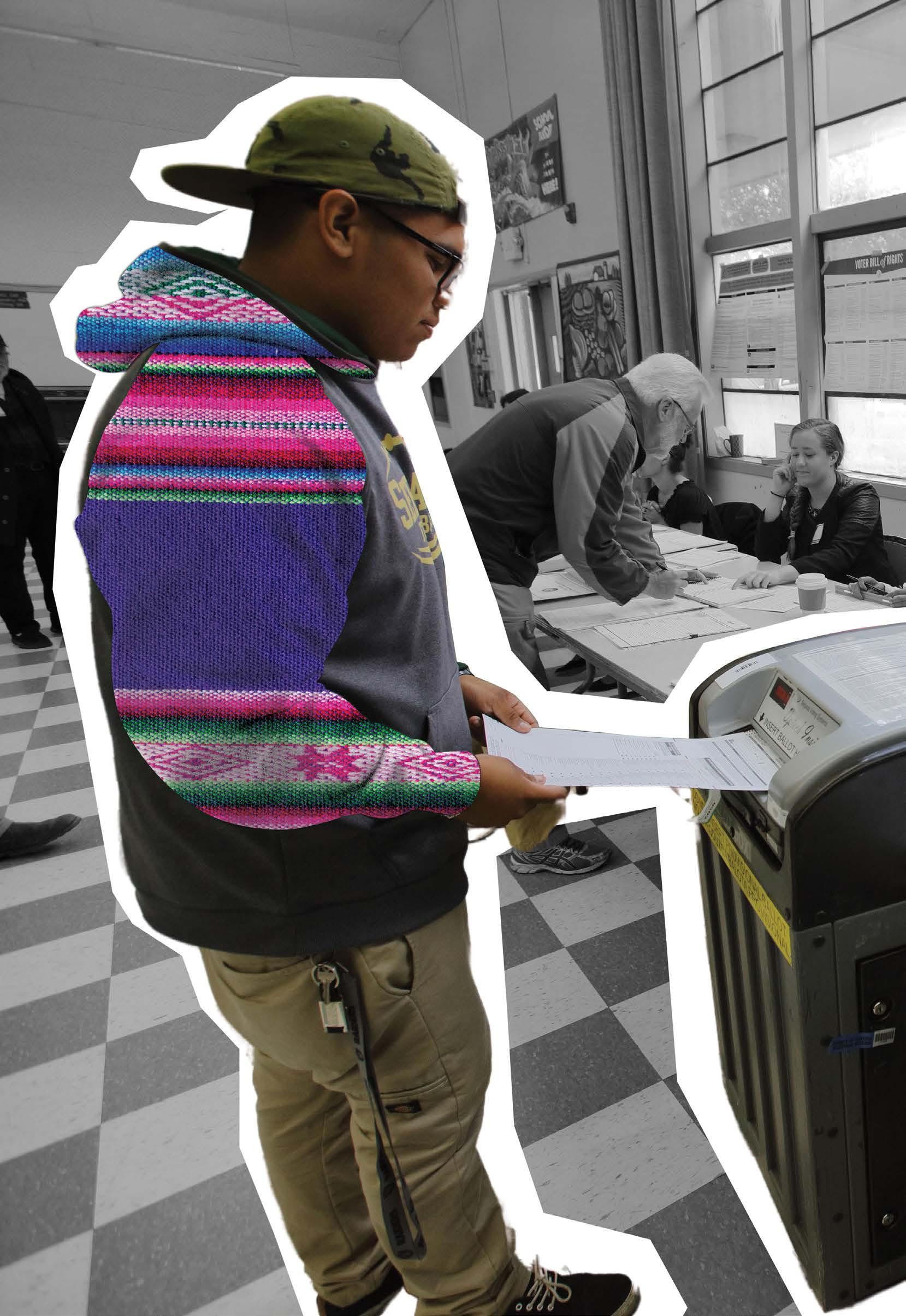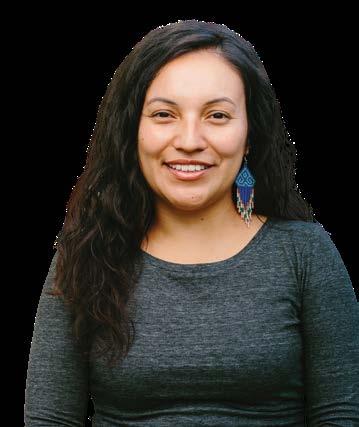










In the past year, the UCLA Latino Policy and Politics Institute (UCLA LPPI) has made significant strides in advocating for Latino communities and pushing for systemic change. Despite numerous challenges, including the COVID-19 pandemic’s disproportionate impact on Latino communities, housing costs, legislative setbacks in immigration reform, and ongoing barriers to equitable access in health care and education, our commitment has remained strong.
In 2023, UCLA LPPI conducted insightful research and advocacy efforts that addressed key issues affecting Latinos and other ethnic groups. Moving beyond simplistic views of Latino identity, UCLA LPPI highlighted the diversity within our communities through our work, including three white papers, 10 fact sheets, and 12 policy reports. These publications focused on crucial topics such as healthcare access disparities, economic mobility through entrepreneurial growth, and environmental justice.
A key achievement was launching the Latino Data Hub in October 2023, a bilingual digital platform providing detailed data on U.S. Latino communities, expanding access to researchers and community advocacy organizations working on policy change within these communities. This tool has quickly become essential for informed decision-making by policymakers, researchers, and community leaders, acting as a force for empowerment and change.
Our efforts to influence policy continued through partnerships and direct engagement, leveraging UCLA LPPI’s role to foster cross-sector alliances and promote inclusivity. We will provide in-depth demographic and socioeconomic profiles of Latino voters in crucial states and will offer training programs and briefings to empower community-based organizations and policymakers to enhance their influence through data.
As we face future challenges, including addressing the growing disparities in education and employment and advocating for improved access to housing and health care, we rely on your continued partnership and support. Utilizing the Latino Data Hub, we will provide in-depth demographic and socioeconomic profiles of Latino voters in crucial states and will offer training programs and briefings to empower community-based organizations and policymakers to enhance their influence through data.
As we face future challenges, including tackling the widening disparities in education and employment and advocating for better access to housing and health care, we rely on your continued partnership and support. We invite all who share our vision of empowering Latinos as key contributors to our nation’s future. Together, we can work towards a more just and inclusive America where the potential of Latino communities is recognized and celebrated. Thank you for your continued support.
The UCLA Latino Policy and Politics Institute
For the past seven years, UCLA LPPI has driven research that has fundamentally changed the conversation around Latinos in America. This research has repeatedly demonstrated the untapped opportunity present within Latino communities and the need to invest in their well-being because they are inextricably linked to building a prosperous economic future and protecting the future of democracy for all.
In 2023, UCLA LPPI’s research continued to shine a light on diverse Latino experiences and challenged the perception of a monolithic community.
In 2023 our staff, experts, and policy fellows produced:
3
6
10
12 white papers academic publications fact sheets policy Reports


Producing 31 publications, our research team highlighted the obstacles Latinos continue to face, from access to health care and environmental injustices to small business hurdles and the need to recognize the complexity and diversity within Latino communities.
Ì Our exploration into Afro-Latinx demographics shared new insights on disparities in education and homeownership within our communities.
Ì Our reports on ethnic entrepreneurship in California, Texas, and Arizona, through the Economic Recovery and Entrepreneurship Project, highlight the vulnerabilities that Asian, Black, and Latino small businesses face compared to white-owned businesses in accessing capital, preparing for climate change, and financially recovering from the COVID-19 pandemic.
Ì Our continued analysis and advocacy of Latino representation in the Los Angeles Times revealed that despite minimal gains, many of which were lost in layoffs, Latino lived experiences, narratives, and insights remain vastly underrepresented, eluding equitable coverage and inclusion for our communities.
Our research sheds light on the unique challenges facing Latino communities, highlighting the need for policy changes to support successful small businesses, ensure representation in local media, and improve overall societal inclusion. By examining issues such as the barriers to small business success, we pinpoint specific policy areas requiring attention. Our goal is to inform and drive policy decisions that better support the Latino community, contributing to a more equitable society for everyone.




Ì Discrimination in the mortgage market and its impact on minority homebuyers
Ì Factors contributing to Latinos’ distrust of tap water

Ì A profile of the U.S. Afro-Latinx Population
Ì The shortage of Latina physicians
Ì Challenges for ethnic small businesses in a just transition
Ì Latino representation in Los Angeles Times’ Opinion section.


Launched in October 2023, the Latino Data Hub (LDH) is a bilingual digital platform that shines a spotlight on the rich tapestry of U.S. Latino communities, offering unparalleled, detailed data that cuts through the noise to reveal insights into voting, income, housing, employment, and education. The LDH comes equipped with data breakdowns for race, gender, and origin, making it an indispensable resource for stakeholders.

As the LDH launched, the team held community briefings to showcase the platform’s capabilities for community members and legislative partners, including the Latino Coalition for a Healthy California, Fresno DRIVE, the Congressional Hispanic Caucus Institute, and members of the Latino Legislative Caucus. These trainings allow the LDH to be truly democratized, empowering policymakers, researchers, and advocates with free, reliable data to craft policies that have an impact on Latino communities.
In 2024, UCLA LPPI is set to unlock the potential of community organizations, leaders, journalists, and students, empowering them through Data Action Labs, a new applied training program for advocates offering data tools and analytical skills to support equitable decisionmaking and inclusive narratives for all Latinos. Utilizing the LDH, these labs will serve as a collaborative for innovative solutions and transformative work. These labs continue LPPI’s work to empower and elevate the voices within Latino communities, making every decision, every policy, and every study count.




In 2023, our mobilization efforts harnessed the influence of the nation’s leading public university to facilitate collaboration among leaders from various sectors, aiming to advance evidence-based policy solutions for achieving greater equity. This approach was characterized by proactive engagement with policymakers, subject matter experts, and advocates through a series of events, trainings, and briefings designed to inform and influence legislative processes.

Close to 40 meetings with legislative offices at the state and federal level, government agencies, and community partners in 2023
8 individual briefings with legislative offices about UCLA LPPI research
7 conference presentations
6 meet and greets with California legislative offices
5 meetings with Congressional Hispanic Caucus members
5 community webinars
3 community small business workshops
Our mobilization efforts also drove advocacy for data-driven policies, including:
Ì CA Senate Bill 702 to influence the Governor’s appointments to state boards and commissions alongside Senator Monique Limón and Hispanas Organized for Political Equality (HOPE).
Ì Working with the Latino Coalition for a Healthy California (LCHC) on CA Senate Bill 1016, sponsored by Senator Lena Gonzalez, to enhance data transparency and collection for Latino and Indigenous communities.
Ì Supporting Senator Caroline Menjivar’s office with environmental justice research analyzing air quality in communities surrounding airports to inform statewide policy interventions.
Our commitment continues into the new legislative session, centering Latino community needs and facilitating policy discussions, including our Annual Policy Briefing in Sacramento in May 2024.
Through collective and unified action, UCLA LPPI aims to bolster and deepen the impact of all organizations and institutions dedicated to equitable outcomes for Latinos and communities of color nationwide. In 2023, we collaborated with the following partners:
Ì American Public Health Association
Ì American Sociological Association
Ì Arizona Hispanic Chamber of Commerce
Ì Arizona State University, Center for Latina/os and American Politics Research
Ì California Association for Bilingual Education
Ì California Hispanic Chamber of Commerce
Ì California Latino Legislative Caucus
Ì California State Water Resources Control Board
Ì Central Valley Community Foundation
Ì Congressional Hispanic Caucus Institute
Ì Hispanas Organized for Political Equality
Ì Hispanics in Philanthropy
Ì Joint Center for Political and Economic Studies
Ì Labor Council for Latin American Advancement
Ì Latina Lawyers Bar Association
Ì Latino Caucus of California Counties
Ì Latino Coalition for a Healthy California
Ì National Association for Latino Community Asset Builders
Ì National Coalition for Asian-Pacific American Community Development
Ì Philanthropy Southwest
Ì President’s Advisory Commission on Advancing Educational Equity, Excellence, and Economic Opportunity for Hispanics
Ì RAND Corporation
Ì Robert Wood Johnson Foundation
Ì Saldaña Public Relations
Ì Stratified Insights
Ì TelevisaUnivision Foundation
Ì The California Endowment
Ì The Census Bureau
Ì The University of California Latinx Staff Association
Ì U.S. Bureau of Labor Statistics
Ì Urban Institute



Ì The Economic Recovery & Entrepreneurship Project (TEREP) supports Latino entrepreneurship in the United States, addressing challenges like business loan approval difficulties, business growth, and professional network expansion. The initiative focuses on equipping Latino business-serving organizations and policymakers with communityinformed research to provide small businesses with the necessary tools for the 21stcentury economy emphasizing policies supporting ethnic-owned small businesses.
Ì Key areas of focus for TEREP include:
Ì Centering Latina Entrepreneurs: TEREP’s research explicitly integrates a Latina lens to highlight the intersecting challenges Latina entrepreneurs face in a series of research reports in Arizona, California, Texas, and beyond.
Ì Supporting An Equitable COVID-19 Recovery: TEREP’s analysis outlines the continued impact of the pandemic on entrepreneurs of color while outlining supports.
Ì Strengthening Environmental Sustainability: TEREP aims to ensure entrepreneurs of color have equitable access to the funding, technology, and resources needed to practice environmental sustainability in the face of climate change.
Ì In 2023, there were three community workshops and six legislative briefings on TEREP. For more information, visit https://latinoterep.com/.




From undergraduate to postdoctoral students and tenured faculty, Latinos are still vastly underrepresented in research and in positions of power and influence in academia. Through robust policy training programs for undergraduate, graduate, and law students, UCLA LPPI is preparing the next generation of Latinos and students of color to lead policy change across various disciplines.
In 2023, UCLA LPPI supported Latino-focused faculty research by awarding $140,000 in research grants on topics from exploring the effects of extreme heat, the uncertain future of DACA and its impact on migrant well-being, to housing values in Latino communities. An additional $55,000 supported programs that close gaps in educational knowledge and professional networks among Latina/o/x social scientists. Lastly, this year, we added nine new faculty members to our roster of experts, expanding our expertise on racial justice, environmental justice, climate, and health.

Dr. Stephanie Canizales, Immigrant Rights

Dr. Paul Ong, Environment and Sustainability

Dr. Claudia Sandoval, Democracy and Voting Rights

Dr. Michael Roy Hames Garcia, Criminal Justice

Dr. Nancy Rodriguez, Criminal Justice

Dr. Sam Sandoval, Water Management

Dr. Nancy Lopez, Afro-Latinx and Demographics

Dr. Diomaris Eliana Safi, Mental Health and Criminal Justice Reform

Dr. Miriam Solis, Water, Environment and Climate Resilience












Ì UCLA LPPI’s student policy fellowship program has provided paid work experience, professional development, and select tuition support to over 116 fellows, including undergraduate, master’s, JD, and Ph.D. students.
Ì UCLA LPPI’s Policy Fellows are primarily first-generation college students who identify as students of color, with a significant representation of Latino students.
Ì In the 2023-2024 academic year, more than 25 fellows gained valuable experience in policy advocacy, working closely with UCLA LPPI staff and faculty experts to contribute to research and policy briefs.
Ì Participants in the program benefit from professional development opportunities, including writing policy and op-ed pieces, honing research methods skills, receiving media training, and close mentoring by UCLA LPPI staff.
Ì Alumni fellows have pursued careers in legislative offices, local government, research, and advocacy organizations, contributing to positive change in policy and governance.



















Every year, Policy Fellows attend an Annual Policy Briefing in Sacramento which brings together state and federal legislative offices, committee consultants, and advocacy leaders to meet directly with the fellows and other UCLA scholars to discuss California’s most pressing policy issues. In May 2023, UCLA LPPI hosted its fourth briefing, which brought together over 20 legislative offices and other organizations to inform policy related to Latino homelessness, improving civic engagement and college access for California’s youth, and the expansion of Medi-Cal coverage to undocumented immigrants.
On October 5, a network of research and community partners, including the Office of the First Partner of California, Equal Rights Advocates, Latina Futures, 2050 Lab, UCLA LPPI, and the UCLA Chicano Studies Research Center (CSRC) hosted a Latina Equal Pay Day event at the UCLA campus to address the persistent wage gap faced by Latinas in the United States, particularly in California.
“Latinas are the backbone of California’s economy– driving growth and participating in the labor market at record rates. Yet they continue to bear the lion’s share of care work and be disproportionately represented in industries society undervalues. This needs to be addressed. Latinas and their contributions to their families, communities, and our society are too valuable to be excluded from economic opportunity. In California, we’re working to transform our economy— in part, by closing the gender pay gap— so it works for all women.”
 – Jennifer Siebel Newsom, First Partner of California
– Jennifer Siebel Newsom, First Partner of California




Ì Nationally, Latinas working full-time year-round, on average, face a wage gap of 57 cents to every dollar paid to white, non-Hispanic men.
Ì When looking at all Latina earners (including full-time year-round, part-time, and seasonal workers), the wage gap widens to 52 cents.
Ì Even Latinas with a bachelor’s degree earn substantially less than their white male counterparts.


The event was part of the Latina Futures, 2050 Lab initiative and it showcased UCLA LPPI and the CSRC’s research findings that Latinas face significant pay disparities compared to white, non-Hispanic men. The program and speakers emphasized the importance of creating an inclusive and equitable economy for all workers and highlighted the need for policy reforms to promote equity for Latinas and other women.
“The Latina Futures, 2050 Lab is conducting research to inform policy reforms that promote equity for Latinas and other women. Addressing the pay gap for Latinas will go a long way in ensuring that women and their families can thrive.”
– Dr. Veronica Terriquez, Co-Director of Latina Futures, 2050 Lab and Director of the UCLA CSRC
UCLA LPPI plays a vital role in national Latino community discussions. This year, the organization secured media presence and engagement with 667 articles across multiple outlets. The media coverage included the New York Times, Los Angeles Times, CNN, Axios, Univision, Telemundo, LAist, WHYY, Axios, CALÓ News, UCLA Newsroom, Sacramento Bee, Yahoo News, and La Opinión, contributing significantly to the dissemination of LPPI’s work.
25,193 articles shared
4.8 M people reached through journalist shares








Over the past five years, UCLA LPPI has grown into a powerhouse institute that ensures Latinos cannot be ignored or cut out of the American story. We are a go-to resource for the media, policymakers, advocates, and other key stakeholders who want to do better for Latino communities. We know that none of our work is possible without talented staff who work tirelessly to put a spotlight on the needs of our nation’s diverse Latino communities.
In 2023, UCLA LPPI’s staff – with the support of our policy fellows team – put out a tremendous body of work that was responsive to emerging issues and helped drive concrete policy outcomes and narrative shift to tell the real story of Latino communities, who are and will continue to be America’s prosperity engine.
Over her time with UCLA LPPI, Jie Zong has proven to be an indispensable asset to the team as a Senior Research Analyst. Jie played a crucial role in the design and implementation of the Latino Data Hub, launched in October 2023. Her expertise, dedication, and innovative thinking have greatly contributed to the team’s success.


Together with her fellow researchers, she has demonstrated dedication to ensuring the accuracy, functionality, and accessibility of the transformative digital platform, which provides in-depth insights into the well-being of the Latino population nationwide.
Jie’s contributions to UCLA LPPI extend beyond the Latino Data Hub. She has worked on numerous projects, providing nuanced insights and analyses that have informed policy decisions and advanced the understanding of issues affecting Latino communities.
“Being a part of the UCLA LPPI team has allowed me to contribute to a cause I deeply believe in - advancing data accessibility to create equitable change. The Latino Data Hub is a testament to our team’s dedication and hard work. It’s been an incredible journey, from conceptualizing the platform to seeing it provide in-depth insights on the opportunities and challenges within Latino communities.”
– Jie Zong , UCLA LPPI Senior Research Analyst
Her profile of the Latino population in the U.S. showcased the utility of the thenupcoming Latino Data Hub, encapsulating two decades of a vibrant and changing community in the U.S. Notably, her research found that the U.S. Latino population is projected to increase from 19% in 2021 to a substantial 28% by 2060. This report explored several key indicators now available in the Latino Data Hub, like descent demographics, socioeconomic trends, and educational attainment.
Prior to joining UCLA LPPI, Jie was a policy analyst for the Migration Policy Institute in Washington, DC, where she provided quantitative research support that has been widely cited in media articles as well as by government agencies, including the White House and the Department of Homeland Security.


Dr. Michael Méndez has made significant contributions as a UCLA LPPI expert and Assistant Professor of Environmental Policy and Urban Planning at the University of California, Irvine. His work has been pivotal in propelling the institute’s research on the interplay between climate change and communities of color. His work has been quoted and cited in notable media outlets such as The New York Times, NPR, and San Francisco Chronicle.

Méndez previously served as the inaugural James and Mary Pinchot Faculty Fellow in Sustainability Studies at the Yale School of Forestry and Environmental Studies. With over a decade of experience in senior-level roles in both public and private sectors, he has been actively involved in the policymaking process.
In 2021, he became the first Latinx scholar to receive the National Academies of Sciences’ Henry and Bryna David Endowment Award for his wildfire and migrant research. Furthermore, he received a National Science Foundation Early Career Faculty Award, which came with a $400,000 grant for a two-year research project titled, “Are Undocumented Latino/a and Indigenous Migrants Worthy Disaster Victims?”. This award clearly recognizes the importance, impact, and influence of his work.

In 2023, Méndez was awarded the William R. and June Dale Scholar Prize, which honors scholars and practitioners for excellence in urban planning and environmental justice work and research. Méndez was appointed by Deanne Crisell, the Administrator of the Federal Emergency Management Agency (FEMA), to serve on their National Advisory Council. In this capacity, council members advise the Administrator on all aspects of emergency management, including preparedness, protection, response, recovery, and mitigation for natural disasters, acts of terrorism, and other manmade disasters.
“Our research is not just about understanding the challenges Latino communities face, but also about highlighting their resilience and capacity for innovation. As we progress, I remain dedicated to promoting environmental justice and fostering positive change through rigorous, data-driven research.”
– Dr. Michael Méndez, Ucla Lppi Expert And Assistant Professor Of Environmental Policy & Urban Planning, UC Irvine

Méndez’s commitment to conducting insightful, data-driven research is paving the way for a more nuanced understanding of the challenges and dynamics facing communities of color in the context of climate change for UCLA LPPI.
Support from the California State Legislature, as well as our partners and donors, helped enable our work to transform Latino students and scholars into leaders, expanded our research into issues areas that have never been explored before, and provided the resources to innovate and design first of its kind data tools for the U.S. Latino community.
Funding from the state of California has allowed us to live our values as a high-road employer and hire staff and over 20 students on an annual basis. With staff funds for professional development, living wages, and paid internship experiences through the Policy Fellows program, UCLA LPPI ensures that our employees and students can focus their efforts on learning data-driven policymaking and building Latino-focused scholarship.

*Other spending includes computer hardware and software, advertising, business meetings, subscriptions, student awards, and communications.
UCLA LPPI also received backing from new philanthropic partners, including the James Irvine Foundation, the California Wellness Foundation, and Bloomberg Philanthropies to expand our research on the social determinants of health, economic justice, and Latino wealth. These investments, along with the assistance of countless other organizations and individuals, have allowed us to amplify the reach and impact of our research in a way that we have never been able to before. Thank you to all our supporters for making 2023 an impactful year.
Ì Alicia Miñana de LoveLace Esq.
Ì Anibal Omar Cortez
Ì Armando Gudino
Ì Bloomberg Family Foundation
Ì California Secretary åof State
Ì Carlos Martinez
Ì Casey Family Programs
Ì The Coalition for Humane Immigrant Rights (CHIRLA)
Ì Eduardo Mercado
Ì Edward J. Avila
Ì Elizabeth Woods
Ì Eric George Mandel
Ì Ernst & Young LLP
Ì Evelyn & Walter Haas
Jr. Fund
Ì Helena Hansen
Ì J. Ed Araiza
Ì James Irvine Foundation
Ì Jennifer Goldstein
Ì Joel Nigg
Ì JP Morgan Chase Foundation
Ì Judy Carmen Torres
Ì Lena Y. Hines
Ì Linda Margarita Gutierrez
Ì Marisabel Torres
Ì Mason Gordon MacDougall
Ì Moët Hennessy USA
Ì Open Society Foundations
Ì Priscilla Toledo
Ì Robert Anthony La Farge
Ì Robert Wood Johnson Foundation
Ì Roberto Manuel Espinoza MA ‘78
Ì Sasha R. Kergen
Ì SoCalGas
Ì Stephanie Claudia Greger M.D.
Ì Tanya Rozik Abrahamian
Ì The California Endowment
Ì The California Wellness Foundation
Ì The Judge/Ellis Family Fund ‘89
Ì The Scott L. Waugh Trust
Ì Thermo Fisher Scientific, Inc.
Ì The W.K. Kellogg Foundation
Ì Thomas Eric Hernandez
Ì Vasquez & Company, LLP
Ì Zac Guevara
Ì Ziwei Hu

As the 2024 election cycle reaches high gear, UCLA LPPI is focused on organizational stability and transparency while expanding skills and opportunities for California’s Latino scholars. Recognizing the amplified importance of this period, we are committed to releasing timely and critical research that not only sheds light on the unique challenges and opportunities for Latinos but also informs the broader electoral dialogue.
This commitment extends to our ongoing efforts to build the next generation of Latino policy experts. Understanding the critical role of data in shaping informed, evidence-based policy, especially during an election year, we are dedicated to expanding the reach of our research and tools like the Latino Data Hub. This will enable policymakers, community members, and stakeholders to engage in informed policymaking.
Our research supports civic education and champions inclusive governance — fundamental pillars that maintain the fabric of democracy. At UCLA LPPI, we play a pivotal role in integrating Latino perspectives into the heart of American discourse and influencing laws and policies at a national level. This year, with the general election at the forefront, we will continue to work to ensure Latinos have equitable access to economic, social, and political systems, thereby shaping a more inclusive and representative nation.







